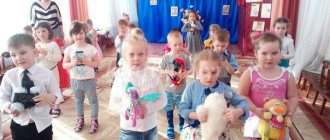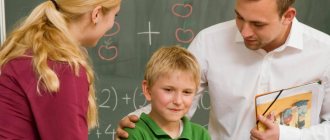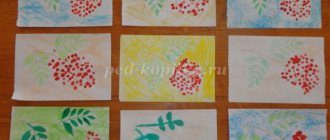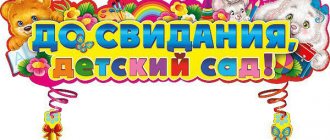Summary of the parent meeting in the middle group of the preschool educational institution Features of the development of children 4-5 years old
Parent meeting in the middle group
“Do you know your child?” </</p>
Goal: Increasing parental competence in the upbringing and education of children.
Tasks:
- familiarizing parents with the age characteristics of children 4-5 years old,
- involving parents in the educational process, creating unified approaches to raising children in a preschool educational institution and family.
Preliminary work:
1. Poll of children “what do you like”
2. Preparation of consultations for parents “What is the Federal State Educational Standard for Preschool Education”, “Psychological characteristics of children 4-5 years old”.
3. Folder moving “Daily routine for middle-aged children in preschool educational institutions”
4. Making an announcement for parents about the meeting
5. Making invitations for parents to the meeting
6. Drawing up an algorithm for parents
7. Drawing up a memo for parents.
Equipment: cards with unfinished sentences, children's answer options, a soft toy, a music center, cards with algorithms, an exhibition of literature for parents, an exhibition of games and toys for children of the middle group.
Meeting plan:
- Organizational moment, “greeting” exercise
- Mini diagnostics “Do I know my child, comparison of results with children’s answers
- Conversation “My Child” invite parents to talk about their child; an algorithm is proposed
- Speech by the teacher on the topic of the meeting
- Game exercise “Pole”
- Game situation “Spicy dish”
- Conclusion, a brief report on the implementation of a new educational program.
Progress of the meeting
The teacher offers the “Greeting” exercise. Participants stand in a circle, a toy is passed around the circle, and the teacher offers an algorithm.
The purpose of the exercise is to create a favorable emotional background.
Educator: Thank you very much, I ask everyone to sit down. Before our conversation begins, we will conduct a mini-diagnosis. I will hand out cards with sentences that need to be completed: my child’s favorite game is..., my child’s friends name is..., my child’s favorite cartoon is..., my child’s favorite book is..., my child doesn’t like to eat..., my child likes to study....
Next, the teacher reads out the children’s answers. Together with the parents, the teacher compares the data and draws a conclusion about how much the parents know their children.
According to the meeting plan, the teacher invites parents to talk about their child.
Story algorithm:
- What is your child like (confident, determined, insecure).
- Is he sociable or not? How does this manifest itself?
- Does the child, in your opinion, have any abilities?
- What is the child’s usual state and mood?
- Does your child cry often?
- How does he fall asleep, how does he sleep?
- Does he often get tired, and if so, why?
- How does he react to failure?
- How does he react to comments and punishments?
- How does a child demonstrate independence?
- What are your relationships like with your peers?
- What other features of your child would you like to tell us about?
Speech by the teacher on the topic of the meeting: Very often parents ask themselves the question why my child does certain things that do not always suit the parents themselves and those around them. To correctly evaluate a child, you need to know his age characteristics. And today I want to introduce you to these features.
At the age of 4-5 years, children begin to develop role interactions. Game actions are performed not for their own sake, but for the sake of the meaning of the game. There is a separation between gaming and real interactions. The technical side of visual arts is being improved, children draw geometric shapes, cut out with scissors, and paste images onto paper. The child’s motor sphere is characterized by positive changes in fine and gross motor skills, dexterity and coordination of movements develop. Perception becomes figurative, simple forms are calculated in complex objects, and the form that this or that object resembles is named. Voluntary memorization begins to develop, they are able to accept a memorization task, and remember the instructions of adults. Imaginative thinking begins to develop, they build according to a scheme, and solve labyrinthine problems. Speech becomes the subject of active activity, the voices of animals are imitated, the rhythmic structure of speech and rhymes are evoked.
The content of communication between a child and an adult changes. It goes beyond the specific situation in which the child finds himself. The cognitive motive becomes the leader; the information may be difficult to understand, but it arouses interest. Leaders begin to emerge in groups, competitiveness and competitiveness appear. Increased sensitivity to remarks is an age-related phenomenon. This concerns the educational side of the issue.
Age norms of behavior 4 years:
- prefers peers to adults in his studies
- group games are preferred to all other activities
- needs the attention of peers and their recognition of their successes
- proactive, inquisitive, willingly and painlessly involved in finding a way out of difficult situations.
- has difficulty and inadequate tolerance for peer rejection
- can show care for a younger person or animal
- can follow turn-taking rules
- can show compassion and care for loved ones
5 years:
- follows a daily routine and enjoys doing it
- exposes any deviation from the accepted routine in the behavior of adults, but is happy to listen to explanations and allows changes to be made if he is brought into the discussion
- enjoys sneaking around
- is interested in the assessment of his work by peers and adults
- maintains the assumed role until the end of the game
- shows compassion and care for loved ones.
Before continuing the meeting, I suggest you take a little rest. Exercise “Pole”, goal: creating conditions for joint actions and teamwork. Progress of the game: all participants stand in a circle, the right arm is bent at the elbow, the palm is clenched into a fist, the index finger of the hand is extended forward, the participants, looking into each other’s eyes, synchronously lower the stick to the floor, which lies on the index fingers of the participants.
Then the teacher offers a practical task “Spicy dish”
A pepper shaker with pieces of paper in it, rolled into a tube, with questions on the pieces:
1. What to do if a child is naughty in the store?
2. The child refuses to go to childcare
3. The child refuses to wear the clothes offered
4. Your child bites
5. Requires the same toy as a friend.
All practical tasks are accompanied by calm music. After the practical tasks, parents are invited to look at the literature exhibition.
The teacher continues his speech:
The following messages concern changes in the general education program. We work according to the program “From birth to school”, edited by N.E. Veraxes. This program is an innovative program document for preschool institutions, prepared by
nym in accordance with Federal state requirements for the structure of the basic general education program of preschool education. Briefly, the essence of this program is raising a successful person.
The program is built on the principles of a humanitarian and personal attitude towards the child and is aimed at his comprehensive development, the formation of spiritual and universal values. The program provides for partnerships between educators, children and parents. It is necessary for parents to participate in all forms of communication and educational processes offered by preschool educational institutions.
In conclusion, I would like to tell you what is being done in preschool educational institutions so that children get sick less. Our garden has developed a plan of health activities for each month. You can get acquainted with it in the parents' corner.
MAGAZINE Preschooler.RF
Long-term plan for working with parents in the middle group.Winner of the all-Russian competition “The most popular article of the month” October 2017
Conditions of the competition:
(forms of cooperation between preschool educational institutions and families)
Author: Subbotina Nadezhda Borisovna
Position: teacher
Place of work: MADOU "Kindergarten No. 5"
September
Parent meeting “Developmental features of children 4-5 years old” . Meeting of parents with the ODN inspector.
Visual information
- Folder “What a 4-5 year old child should know .
- Ecological page “Take care of nature” .
- Information stand “Security Territory” (home safety)
Individual consultations, conversations
- Individual conversation “Teaching a child to communicate with peers .
- Speech therapist consultations.
Active forms of work (leisure activities, interest clubs, holidays)
- Entertainment “Goodbye, autumn!” .
- Promotion “Second Life of Paper” (collection of waste paper)
October
Visual information
- Information stand “A child also has rights .
- Folder “A toy in a child’s life” .
Individual consultations, conversations
- Individual consultation “How to spend a weekend with children .
- Conversations . ”
Active forms of work (leisure activities, interest clubs, holidays)
- Joint leisure time “What autumn brought us”
November
Visual information
- Health corner “Flu is dangerous!”
- Ecological page “Learning to observe”
- Information stand “National Unity Day” - a return to history
Individual consultations, conversations
- “Good manners are not just for adults.”
- "Unhealthy products"
- Active forms of work (leisure activities, interest clubs, holidays)
- Charity events for World Children's Day
December
Parent meeting “Features and problems of speech development in middle-aged children .
Visual information
- Folder “History of the New Year” holiday
- Information stand “Safe New Year” .
Individual consultations, conversations
- Meeting with the head nurse of the preschool educational institution
- "Proper nutrition for children".
- Clothes for winter.
Active forms of work (leisure activities, interest clubs, holidays)
- Ecological campaign “Small Birds” making feeders
- Joint project “New Year’s Tale” (group decoration) Master class from parents “New Year’s Card”
- Matinee “Hello, holiday - New Year!” .
January
Visual information
- Information stand “Development of cognitive interest in preschool children”
- Folder “Christmas Bustle”
Individual consultations, conversations
- Individual conversations about mastering the educational program.
- Meeting with the head nurse of the preschool educational institution “Allergies in a child, prevention of exacerbations”
- Recommendations for organizing a book corner at home.
Active forms of work (leisure activities, interest clubs, holidays)
- "Family Reading Club"
February
Visual information
- Folder “Mathematics is interesting ”
- Designs for the exhibition “Books We Read at Home” .
Individual consultations, conversations
- The role of the father in raising a child.
- Individual conversation “Safety at home” .
Active forms of work (leisure activities, interest clubs, holidays)
- Questionnaire “The place of sports in your family” .
- Physical education holiday “Mom, Dad. I am a sports family"
March
Parent meeting “Development of creativity in children” .
Visual information
- Information stand “ABC of a small pedestrian” .
- Ecological page “Towards Spring” (drawings, crafts).
Individual consultations, conversations
- “How to get rid of a bad habit”
- Consultation “How to teach a child to show respect for elders .
Active forms of work (leisure activities, interest clubs, holidays)
- Round table "Family traditions" .
- Master class for parents from mom “Magic quilling”
April
Visual information
- Folder “Developmental subject environment at home for preschool children .
- Environmental page “Outdoor games with an environmental focus .
Individual consultations, conversations
- Consultations “Children and Computers” .
- Conversations “Education of cultural and hygienic skills” .
Active forms of work (leisure activities, interest clubs, holidays)
- Questionnaire “Modern technologies and the child” .
- Entertainment "Spring-Spring" .
May
Parent meeting Final parent meeting “Our successes” .
Visual information
- Information stand . ”
- Photo exhibition “My grandfather is a soldier” .
- Consultation “Games with a child during a long journey .
Individual consultations, conversations
- Consultation with a psychologist “Little “provocateur” .
- Travel first aid kit.
- Conversation “Proper nutrition of a child in the summer .
Active forms of work (leisure activities, interest clubs, holidays)
- Preparing the site for the summer period.
- A joint hike in a pine forest.
| Next > |
Middle group. Junior preschool age. Children 4 - 5 years old
Photo report on remote work with parents and children “Transport” (younger preschool age)
To develop in children the ability to distinguish vehicles by appearance; name trucks and cars, buses, trains, airplanes, as well as their main parts: cabin, body, steering wheel, wheels, doors, windows, trailers, wings, body and tail of an airplane. Enrich your vocabulary...
Long-term plan for interaction with families of middle group students Long-term plan for interaction with families of middle group students September Deadline Event Goals Responsible person 1 week “We are not too lazy to study!”
1. Design of
a parent’s corner on the topic “We are not too lazy to study
.
2. Consultation for parents “Why you shouldn’t be late for kindergarten...



